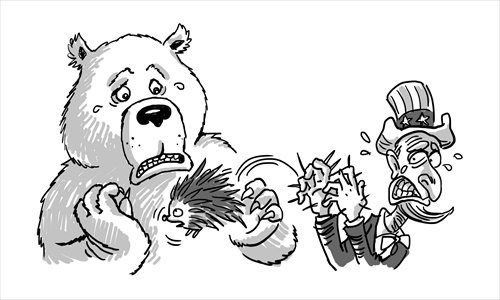No return to Afghanistan for nervy Russia

With 2014 and the departure of US forces approaching, more decision-makers around the world are questioning the future of Afghanistan. NATO's departure, without delivering on the promises the alliance made to the international community in 2001, signals that the US and their allies want to get out of Afghanistan as soon as possible.
"Does this prompt departure mean that you are leaving the hot potato to us?" a high-level Russian diplomat asked his NATO counterpart in Brussels in December 2012.
He didn't get a straight answer, but one thing is clear: The West looks at the countries around Afghanistan as powerful stakeholders which could help hold the country together and mitigate the challenges Afghanistan will face after 2014.
Under these circumstances, many eyes are turning to Russia. Moscow is the only power which has recent experience of controlling most of Afghanistan's territory and keeping a loyal regime there afloat for several years after the departure of its troops.
Russian politicians are stating in public that they are "very concerned" about the future of the country, and that Russia has "vital interests" in keeping Afghanistan stable. Does it mean Russia's possible return to the region after 2014? Not at all.
Russia is never going to have boots on the ground in Afghanistan. Russia's Foreign Minister Sergey Lavrov repeatedly said that the country's soldiers would "under no circumstances" go back there.
The reasons are obvious. For many Russians, the war in Afghanistan is best forgotten, since the country lost about 15,000 soldiers there, six times more than the US.
The majority of the country's population considers the 1979 invasion of Afghanistan to have been unnecessary and is strongly against any Russian involvement in the International Security Assistance Force operation.
Another reason, which is probably even more important, is that the Russian military budget will not sustain as a military presence in Afghanistan in any form.
A very instructive example is Moscow's reaction to the 2010 humanitarian crisis in Kyrgyzstan. Russia refused to send troops to a country it considers to be part of its sphere of influence and which is a member of the Collective Security Treaty Organization (CSTO), a Russia-led military block.
Moscow wants to present as a "counterweight" to NATO. In private conversations, Russian officials confess that Moscow cannot afford such luxuries as military expeditions when its vital interests are not concerned.
If not a military return, what about an economic one? But that doesn't look promising either.
It's true that the Soviet Union constructed much of the industry and infrastructure that used to be the backbone of the Afghan economy in the 1980s. But now Russia doesn't have the funds to restore them.
For example, in 2010, Russia's then ambassador to NATO, Dmitry Rogozin, now deputy prime minister, demanded that contracts for renovation of all these objects should be given to Russian companies without tenders and NATO-countries should provide financing.
Of course this grand plan was doomed to failure. Russian attempts to get mining rights in Afghanistan also collapsed because Russian companies didn't have enough money to compete with the Chinese or multinationals.
The only thriving part of the economic relationship between Moscow and Kabul is the procurement of Russian military helicopters for the Afghan National Army, which is funded by a special NATO fund.
But the situation in the country is important for at least two reasons. First of all, Afghanistan is the leading source of narcotics, notably heroin, which end up in Russia. The second reason is the threat of Islamism in Central Asia.
Few people believe that Afghanistan will be an aggressive Islamist state spreading radical ideology. It wasn't even when the Taliban ran the place. But it could be used as a base by radical movements to destabilize secular regimes in Central Asia, which could be a challenge for Russia in terms of migration, organized crime and so on.
The only way for Russia to mitigate those challenges is to work through multilateral institutions.
Moscow needs to keep cheap but efficient instruments for helping the Afghan government, like counter-narcotics training for the Afghan police, support for NATO in its effort to make Hamid Karzai's government stable, the use of CSTO and Shanghai Cooperation Organization to make Afghan border with Central Asia more secure, and welcoming Chinese and Indian investment in Afghan mining sector.
The author is deputy editor-in-chief at the Moscow-based Kommersant-Authority Weekly. opinion@globaltimes.com.cn